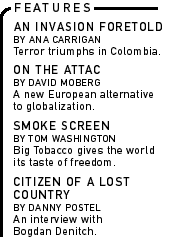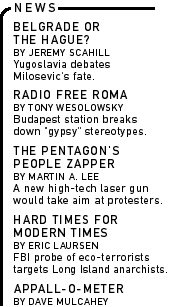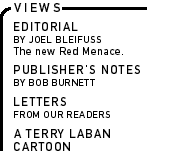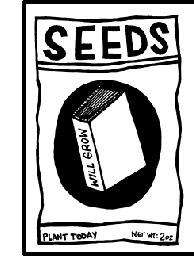

|

|

|

|
| |
|
|||
|
Troublemaker: The Life and History of A.J.P. Taylor Long before the high-flying multimedia exploits of Niall Ferguson and Simon Schama, gadfly British historian A.J.P. Taylor pioneered the now ubiquitous role of the "media don." In the '50s and '60s, Taylor was a familiar fixture on the British airwaves, delivering, often extemporaneously, radio and television lectures on the topics of the day and the vagaries of the European past to millions. Above all, Taylor loved to write. A buccaneering freelancer, he appeared frequently on the books pages of the Guardian and the New Statesman, leading organs of liberal journalism, and in more down-market papers, which did little to endear him to his more fastidious and media-shy colleagues, who thought his have-opinion-will-sell-it attitude merely vulgar. He cut to the quick in his writing--of Metternich, he wrote, "his thoughts, like those of most conservatives, were banal and obvious"--and cut the powerful down to size. Over the course of his life, Taylor cranked out some 1,600 book reviews (this reviewer shudders at his productivity), some 600 learned essays and 23 books. He never seemed to suffer from writer's block. A popularizer par excellence, Taylor wrote with wit, playfulness and a common touch that was neither vulgar nor dumb. But he was also a real historian, who wrote serious studies of European diplomacy, most notoriously The Origins of the Second World War (1961)--more on that later. The title of Kathleen Burk's new biography, Troublemaker, is apt. Fellow historian
Surely the Soviets could hardly be called "pacific" (and Taylor himself once wrote of Communism as "the barren thing that it is." Yet ever the contrarian, he could not tolerate the U.S. crusade against the Soviet Union--what he called a "prejudice [masquerading] under the name of anti-Communism"--since in his view, all Russia wanted was to be left alone. His distrust of American power, coupled with a passionate awareness of the consequences of accidents in history--a cherished historiographical notion of his--and their terrible implications for the nuclear age, led Taylor in the late '50s to become active in the Campaign for Nuclear Disarmament, which counted among its members fellow radicals E.P. Thompson, Bertrand Russell and Labour MP Michael Foot. Despite his nearly 40-year affiliation with Magdalen College at Oxford, he never attained the more prestigious University-wide professorships; Burk makes it quite clear that Taylor's iconoclasm cost him professionally. But while his academic path stalled, his idiosyncrasies made him a great historian. As Burk notes: "Trusting his intuition, Taylor assumed the mantle of iconoclast. He knew that he was good; he saw himself as basically a dissenter: and the result was a stream of books and essays in which he took delight in questioning accepted historic truths." Burk, who was one of Taylor's last students in the early '70s, clearly reveres her former teacher (but not uncritically). She has written a mostly fine, well-researched biography, which is good on Taylor the man and Taylor the intellectual, but marred by structural problems. Instead of opting for a straightforward narrative weaving together multiple threads of Taylor's life, journalism and scholarly work, she divides his life into compartments, devoting separate chapters to his academic career, his scholarly output and his freelance life. We revisit the same episodes from a number of perspectives, but the result isn't as illuminating as Burk hopes. Still, Taylor's life is fascinating enough to overcome what missteps his biographer makes. Born to an affluent, left-wing family in 1906 in the Lancashire town of Birkdale (now a suburb of Liverpool) and educated at Quaker schools, he went up to Oriel College, Oxford in 1924. When he hung a picture of Lenin in his rooms, they were wrecked--presumably by a toff who thought him a Communist. Though he did join the CP briefly, Taylor was disgusted with what he saw as the party's do-nothing approach in the General Strike of 1926. Taylor stumbled into history by accident, he was fond of saying. Uncertain about his
The two-year stint in Vienna resulted in his first book (on the Great Powers and Italy), a pioneering work of diplomatic history. Upon his return to England in 1930, he secured an appointment at Manchester University. In the '30s, Taylor became active in trade-union politics, developing his talent for speaking to audiences by often addressing hundreds in town meetings. In 1938, he became a fellow of Magdalen College, where he remained in varying capacities until 1978. During the war, Taylor lectured servicemen about modern Europe and also delivered radio lectures. After the war ended, he continued to write, and moved into television work, his opinions often running afoul of the BBC. This fame shaded into notoriety after The Origins of the Second World War was published in 1961. Many accused Taylor of being a Hitler apologist--with the war and Holocaust all too recent, statements like "in principle and doctrine, Hitler was no more wicked and unscrupulous than many a contemporary statesman" were simply too shocking to contemplate. The fact that Taylor had not read Mein Kampf set him up for charges of shoddy scholarship. Here was another example of stubborn old Taylor, but also of his skepticism about intentions and ideology. For Taylor, Burk writes, "writings such as Mein Kampf were largely irrelevant; they may have expressed hopes or dreams, but they were not organized blueprints for action." Still, Origins has survived as a classic. Full of compact, epigrammatic sentences, it still startles today, not least because of his notion that there were no "good guys"; it was, he writes, a "story without heroes; and perhaps even without villains." And the story he tells is as much about the missteps and bumbles of the Allies as Nazi aggression. He respects the complexity of history, how events have their own logic. His attempt to put Hitler into the context of German history--to strip him of his supernatural varnish--is rather profound. But Taylor hardly lets him off the hook for his crimes: He may have acted like other statesmen, but "in wicked acts he outdid them all." He claims that Hitler merely reflected the German people, another leader in a long line of German nationalists. This sort of Germanophobia can get the better of him, but his notions about the relationship between the German people and the FŸhrer, while still controversial, have been taken up by other historians. (One need only read Ian Kershaw's brilliant two-volume life of Hitler for a full-fledged exploration of this dynamic.) So what is Taylor's legacy today? After Taylor died in 1990, his
obituaries were warm; even Trevor-Roper wrote a fond reminiscence.
Burk writes: "How and why he was great is a difficult question--he
instigated no new methodology, opened up no new field of research,
left no school of disciples." True, but, as one of Taylor's acolytes
said, "What was striking was not the novelty of his topic but the
brilliance of his treatment." For Taylor, a little style went a
long way. Matthew Price is associate editor of Lingua Franca.
|



